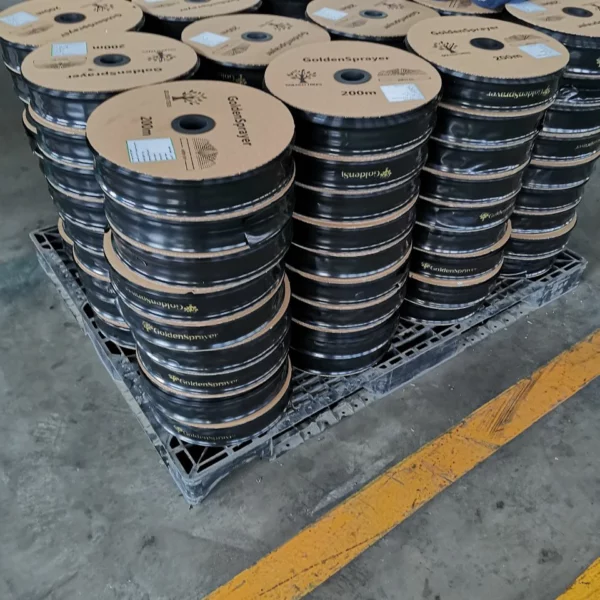To maintain the eco-friendly status of φ40 Spray Tube and ensure responsible environmental practices, consider the following maintenance considerations and disposal methods:
Maintenance Considerations:
- Regular Inspection: Periodically inspect the tubing for signs of damage, wear, or clogs. Address any issues promptly to prevent leaks or water waste.
- Proper Cleaning: If clogs or debris accumulate in the tubing, clean it thoroughly to maintain its efficiency. Use eco-friendly cleaning agents and methods to minimize environmental impact.
- System Pressure: Monitor and maintain the proper system pressure to prevent damage to the tubing and reduce the risk of leaks.
- Leak Detection: Routinely check for leaks and fix them immediately. Even small leaks can lead to water waste and environmental harm.
- Protection from UV Exposure: Ensure that the tubing is shielded from prolonged exposure to UV (ultraviolet) radiation, which can cause degradation. Use protective coverings or bury the tubing to shield it from sunlight.
Disposal Methods:
- Recycling: If the tubing is made from recyclable materials, consider recycling it when it reaches the end of its useful life. Check with local recycling centers or municipal waste disposal facilities to see if they accept plastic irrigation tubing for recycling.
- Reuse: Whenever possible, reuse the tubing in your irrigation system. Even if it’s no longer suitable for your primary application, it may serve in secondary roles or for non-critical water transport.
- Proper Disposal: If recycling or reusing is not an option, dispose of the tubing responsibly. Do not abandon it in the environment or leave it exposed to the elements, as this can lead to environmental pollution.
- Local Regulations: Check local regulations and guidelines for the disposal of plastic materials, as they can vary by location. Compliance with local disposal rules ensures you’re following environmentally responsible practices.
- Professional Assistance: If you’re unsure about the best disposal method or have a large quantity of tubing to dispose of, consider seeking advice from waste management professionals or recycling centers.
- Material Identification: Be aware of the specific material composition of the tubing, as different plastics have different recycling or disposal requirements.
It’s important to remember that maintaining the eco-friendly status of φ40 Spray Tube isn’t limited to the product itself; it also involves responsible use, maintenance, and disposal practices. By following these considerations, you can help minimize the environmental impact of your irrigation system while extending the lifespan of the tubing.
How does using an environmentally friendly φ40 Spray Tube contribute to water conservation in irrigation systems?
Using an environmentally friendly φ40 Spray Tube can contribute to water conservation in irrigation systems in several ways:
- Efficient Water Delivery: An environmentally friendly φ40 Spray Tube is designed for efficient water distribution. It can deliver water directly to the root zones of plants, ensuring that water is used where it’s needed most. This precision minimizes water wastage and promotes plant health.
- Reduced Water Waste: The tubing’s design and materials help prevent leaks and losses. environment friendly φ40 Spray Tube Leaks can be a significant source of water waste in irrigation systems. Environmentally friendly tubing is less likely to degrade or develop cracks, leading to reduced water losses.
- Optimized Watering Schedules: The controlled and efficient water delivery of φ40 Spray Tubes allows for precise control of irrigation schedules. This means watering only when necessary and in appropriate amounts, which minimizes overwatering and runoff.
- Prevention of Overhead Evaporation: Unlike overhead irrigation methods, which can result in significant water loss due to evaporation, drip irrigation systems using spray tubes apply water close to the soil surface, minimizing exposure to the air and reducing evaporation.
- Reduced Soil Erosion: The gentle flow of water from the spray tube helps prevent soil erosion, which can occur with high-velocity water streams from other types of irrigation. Soil erosion leads to sediment runoff and water pollution.
- Weed Control: By delivering water directly to plant roots, spray tubes reduce the moisture available for weed growth between rows or in undesired areas. This not only conserves water but also minimizes the need for weed control measures.
- Customizable Layout: Users can customize the layout of spray tubes to match the planting arrangement, ensuring that each plant, regardless of its location, receives an equal and adequate supply of water.
- Fertilizer Efficiency: Environmentally friendly φ40 Spray Tubes can be integrated with fertilizer injection systems, allowing for precise and uniform application of fertilizers to the root zone along with water. This promotes efficient nutrient use.
- Automated Control: The use of sensors and automated control systems can further enhance water conservation by responding to environmental conditions and plant needs, reducing the risk of overwatering.
In summary, using an environmentally friendly φ40 Spray Tube promotes water conservation in irrigation systems by delivering water efficiently and precisely to plant roots, reducing water waste through optimized schedules, and preventing losses due to evaporation, runoff, and soil erosion. These factors contribute to responsible water management and sustainable irrigation practices.
